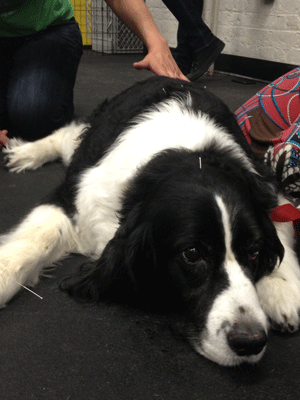
BY JANEL BLADOW | As the first thin, shiny needle was inserted into the top of Aloha’s head, you could swear a smile crept across her face. Once she was crowned with several needles, the 13-year-old purebred English springer spaniel lowered her head and sank into a Zen-like state — never mind that 15 people stood around her, mouths agape and cameras snapping.
Aloha was enjoying her Acupuncture treatment and wasn’t embarrassed to show how good it felt.
This was the demo portion of the first of a series of three seminars over six weeks presented by the Downtown Veterinary Medical Hospitals Group at Animal Haven on Centre Street. The course, dubbed Pet Acupuncture and Alternative Medicine and taught by veterinarians Lucy O’Bryne and Kristin Lester, outlines the history of acupuncture and its application to cats, dogs and other animals.
The Oct. 16 course, which focused on pet dentistry and taking care of a pet’s smile, featured a demonstration on how to properly brush the pet’s teeth. The program will wrap up on Tues., Nov. 13 with a class on senior pet care. The discussion, which will center on “how to help keep that spring in your pet’s step,” according to the itinerary, will teach ways to care for an older pet, including red flags to look for as the animal ages.
“Veterinarians came to us wanting to get the word out about pet awareness on hot topics, so it’s a win-win for everyone,” said Animal Haven executive director Tiffany Lacey of the program. “We can teach about responsible pet ownership, and the vet’s office shows what they’re doing.”
On the drizzly Tuesday night of the Acupuncture class, approximately 25 pet owners and five dogs showed up at the shelter. Dr. Lester, who works out of the group’s Seaport and Battery Park veterinary hospitals, opened with an overview of acupuncture, which began as bloodletting procedure in 900 B.C. It only became an acceptable treatment for animals about 50 years ago, even though documentation of animal acupuncture exists dating back to as early as 621 B.C.
Animals have 173 acupuncture points — compared to the human count of 361 — that control energy flow, or what acupuncturists refer to as Qi. The goal is to maintain the energy flow in yin and yang.
“It’s a whole system approach, not just treating the symptoms we see now,” said Dr. Lester in explaining the difference between acupuncture and forms of Western medicine.
Thin, sterile needles carefully inserted into the dog’s skin stimulate points along the pathways of nerves, arteries and veins. This activates impulse relays and chemical reactions that increase blood flow and decrease inflammation, thereby reducing the nervous system’s reaction to pain.
The average acupuncture session lasts between 20 minutes and an hour, and most animals need one or two sessions a week for two to four weeks to recover. Dr. Lester has treated animals with the Eastern medical practice for everything from stomach upsets, chronic hip ailments and behavior problems such as anxiety.
“I can tell it helps by the way they look during and after treatment,” said Dr. O’Byrne, who is based at West Village Veterinary Hospital. As did her pooch Aloha during the demonstration, most dogs become relaxed and peaceful, she said. Some of them even fall asleep.
Sedation, therefore, isn’t usually required and, like humans, animals experience a warm tingly or itchy sensation where the needles are inserted. “I think animals are tougher than us. “The day after, the animal is calmer,” said Dr. O’Bryne, noting that pet owners can determine if the treatment is working a couple days later, when signs of the dog’s or cat’s progress typically appear.
According to the veterinarians, acupuncture is a big help in treating pets’ behavior problems such as separation anxiety. “Animals with anxiety and food issues in general benefit from treatment,” Dr. O’Bryne noted. “It helps dogs who are super stressed or afraid of noise.”
Animal acupuncture isn’t used to treat cancer, open wounds, fractures or unstable spinal injuries. The veterinarians recommended using a combination of Eastern therapies — acupuncture and herbal treatment — and Western medicine to cure pets’ health issues.
Older pets, too, can be helped with treatments for stimulating appetite, limb troubles and hip and bladder problems. “No age is too old,” said Dr. O’Bryne. “Some older dogs can’t walk for a couple days after as their bodies heal.”
Though each case needs to be considered individually, there is a very low probability that acupuncture will injure the animal, according to the veterinarian. “Ninety-nine percent of the time it’s worth trying.”
To R.S.V.P. for the next seminar, visit www.AnimalHavenShelter.org.





































